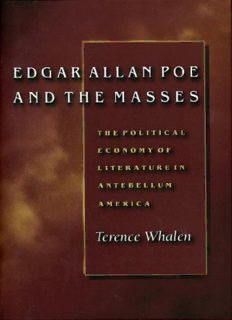
Edgar Allan Poe and the Masses PDF
Preview Edgar Allan Poe and the Masses
EDGAR ALLAN POE AND THE MASSES This page intentionally left blank EDGAR ALLAN POE AND THE MASSES THE POLITICAL ECONOMY OF LITERATURE IN ANTEBELLUM AMERICA TERENCE WHALEN PRINCETON UNIVERSITY PRESS PRINCETON, NEW JERSEY Copyright1999byPrincetonUniversityPress PublishedbyPrincetonUniversityPress,41WilliamStreet, Princeton,NewJersey08540 IntheUnitedKingdom:PrincetonUniversityPress, Chichester,WestSussex AllRightsReserved LibraryofCongressCataloging-in-PublicationData Whalen,Terence,1959– EdgarAllanPoeandthemasses:thepoliticaleconomyof literatureinantebellumAmerica/TerenceWhalen. p. cm. Includesbibliographicalreferencesandindex. ISBN0-691-00199-5(cloth:alk.paper) 1.Poe,EdgarAllan,1809–1849—ContemporaryAmerica. 2.Literature—Economicaspects—UnitedStates—History— 19thcentury. 3.Authorship—Economicaspects—UnitedStates— History—19thcentury. 4.Capitalismandliterature—United States—History—19thcentury. 5.Politicsandliterature— UnitedStates—History—19thcentury. 6.Literature— Publishing—UnitedStates—History—19thcentury. 7.Authorsand readers—UnitedStates—History—19thcentury. 8.Popular literature—UnitedStates—Historyandcriticism. 9.Massmedia— UnitedStates—History—19thcentury. I.Title. PS2633.W48 1999 818′.309—dc21 98-43053 CIP ThisbookhasbeencomposedinBerkeleyBook Thepaperusedinthispublicationmeetstheminimumrequirements ofANSI/NISOZ39.48-1992(R1997)(PermanenceofPaper) http://pup.princeton.edu PrintedintheUnitedStatesofAmerica 10 9 8 7 6 5 4 3 2 1 For Robin This page intentionally left blank CONTENTS PREFACE ix LISTOFABBREVIATIONS xi PARTONE:CAPITALISMANDLITERATURE 1 CHAPTERONE Introduction: MinorWritingandtheCapitalReader 3 CHAPTERTWO TheHorridLawsofPoliticalEconomy 21 CHAPTERTHREE FablesofCirculation: Poe’sInfluence ontheMessenger 58 CHAPTERFOUR PoeandtheMasses 76 PARTTWO:RACEANDREGION 109 CHAPTERFIVE AverageRacism:Poe,Slavery,andtheWagesofLiteraryNationalism 111 CHAPTERSIX SubtleBarbarians:TheSouthernVoyageofEdgarAllanPoe 147 PARTTHREE:MASSCULTURE 193 CHAPTERSEVEN TheCodeforGold:PoeandCryptography 195 CHAPTEREIGHT CultureofSurfaces 225 CHAPTERNINE TheInvestigatingAngel:Poe,Babbage,and“ThePowerofWords” 249 NOTES 275 INDEX 323 This page intentionally left blank PREFACE EDGAR ALLAN POE and the Masses explores the relationship between literature and capitalism in antebellum America. Broadly concerned withtheemergenceofanationalculturebeforetheCivilWar,thebook focuses on Poe because he exemplifies, as much as anyone, the predicament of a “poor-devil author” inan ageof socialand economic turmoil. Througha series of far-reaching investigations, the book unfolds a new account of the Americanpublishing industry,whichhadbeguntoregulatenearlyallaspects ofliterarycreation. Poewasacutelyawareoftheconsequencesofthenewpublishingenviron- ment, for like his character Roderick Usher, he possessed an uncanny sensi- tivity to material powers in the world around him, powers which seemed to foretelltheimpendingtriumphofmatterovermind.SometimesPoedescribed thisimpending transformation incosmological terms,butonotheroccasions hemeticulouslyanalyzed“themagazineprison-house”andthe“horridlawsof political economy.” Contrary to his image asan artist whowas“out of space, outoftime,”Poerespondedtohiseconomicpredicamentinavarietyofways, ranging from theoretical pronouncements on literary value to practical ven- tures in the magazine business. Poe and the Masses accordingly departs from criticalloreandinsteaddepictsawriterwhowasbothproductandportentof anemergingmassculture. Making extensive use of primary materials, the individual chapters offer severalnewcontributionstoourunderstandingofPoeandhisworld:thefirst fully documented interpretation of Poe’s response to American slavery; the first accurate account of Poe’s performance as a literary entrepreneur; a new explanation of Poe’s ambivalence towardnationalism, exploration, andimpe- rialism;adetailed inquiryintotheconflictbetween“secretwriting”andcom- mon knowledge in Jacksonian America; and a general interpretation of the socialmeaning ofPoe’sinnovationsinliterature andcriticism.AsIsuggestin the final chapter, Poe’s inability to escape the “horrid laws of political econ- omy”ultimatelyinspiredhisrecurrentdreamofamateriallanguagethatcould transporthimbeyondtheboundsofcapitalist regulation. . . . . . I am grateful to the many people who helped make this book possible. A reading group at Duke University gave me confidence to pursue this proj- ect; my thanks to Tito Basu, Joe Cole, Tim Dayton, Craig Hanks, Angela Hubler, Caren Irr, Carolyn Lesjak, Bill Maxwell, and many visitors. I am also grateful to Professors Cathy Davidson, Robert Gleckner, Ric Roderick, and
Description: